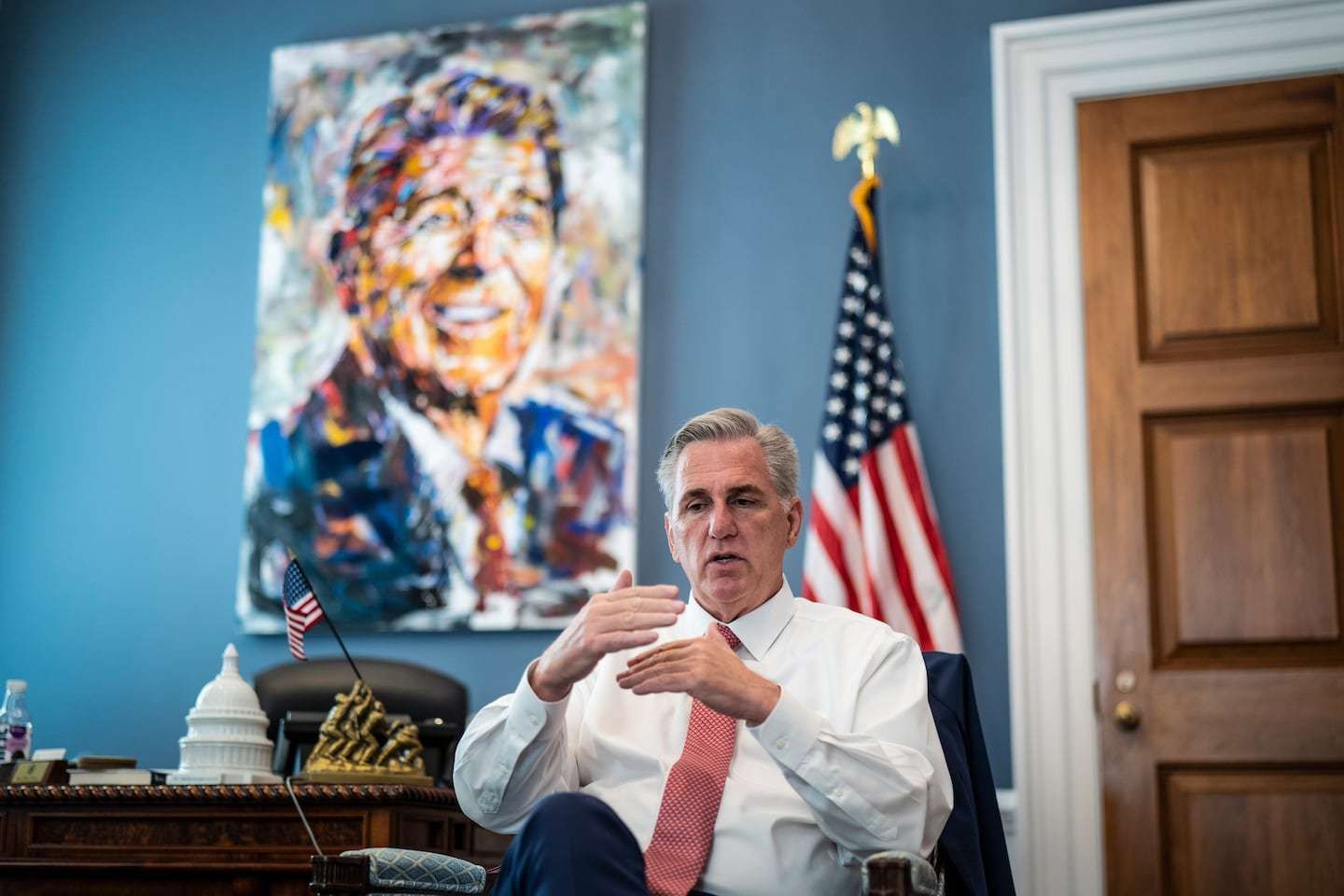After Russia invaded Ukraine in February, House Minority Leader Kevin McCarthy (R-Calif.) sought to out-hawk President Biden and the Democrats.
McCarthy’s striking warning signal on GOP and Ukraine aid

In a new interview, though, McCarthy is singing a significantly different tune. He says that if Republicans win back Congress, we shouldn’t take for granted that the United States will send further military aid to Ukraine.
“I think people are going to be sitting in a recession and they’re not going to write a blank check to Ukraine,” McCarthy told Punchbowl News. “They just won’t do it. … It’s not a free blank check. And then there’s the things [the Biden administration] is not doing domestically. Not doing the border and people begin to weigh that. Ukraine is important, but at the same time it can’t be the only thing they do, and it can’t be a blank check.”
A few points.
First: This statement does not so much rule out future military aid to Ukraine as suggest it might be more limited and difficult to obtain. But whether that’s because certain Republicans might demand budget offsets or simply don’t want to send as much money overseas, the practical effect is a GOP leader warning that Congress could soon get quite a bit stingier if his party is in charge.
The second is, as Punchbowl notes, this could double as a ploy to force the Biden administration’s hand. If there’s legitimate fear that a GOP-run Congress could stand in the way of more generous aid to Ukraine, it could prompt the currently Democratic-controlled Congress to pass a major bill in the lame-duck session, extending military aid. McCarthy spoke about this issue in terms of what his party might do rather than, necessarily, what he would personally advocate. And to the extent he wants Ukraine fully funded, he could be sending a signal that it’d be best to not leave it to the mercy of his own unwieldy conference.
Either way, though, it’s a remarkable bit of expectation-setting — particularly as evidence increases of Ukraine’s success in warding off the Russians.
Congress has thus far passed more than $60 billion in aid for Ukraine — twice in smaller packages attached to government spending bills, and once in a $40 billion package back in May.
At the time, just 57 House Republicans voted against the package. But the signs of potential recalcitrance soon emerged.
Former president Donald Trump criticized Congress’s decision to send $40 billion, while suggesting that it should be more focused on a baby formula shortage. And when the Biden administration requested an additional $12.3 billion last month, the fiscal hawks and “America First” crowd began to assert themselves. Some prominent conservative groups such as Heritage Action said outright that they opposed the package. The Conservative Political Action Committee also recently tweeted, “When will Democrats put #AmericaFirst and end the gift-giving to Ukraine?” before deleting the tweet and watering down its sentiment.
The House’s No. 2 and 3 Republicans declined to commit to keeping the aid flowing in the next Congress, with No. 2 Rep. Steve Scalise (La.) emphasizing more “accountability” for the money and the need to invest in the country’s own defense, such as the Pacific fleet, with China looming. The No. 3, Rep. Elise Stefanik (N.Y.), noted that this would be a decision for whomever is elected to the next Congress.
Senate Minority Leader Mitch McConnell (R-Ky.) struck a different tone, though, emphasizing that this was a bipartisan issue and downplaying the possibility that Republicans would stand in the way of continued aid.
“There are a few voices on the right that seem to oppose the war, but the vast majority of us, certainly including myself, think defeating the Russians in Ukraine is high-priority,” McConnell told Defense News.
The comments from McConnell’s House counterpart, then, are perhaps the biggest acknowledgment to date that the willingness of the GOP could be a stumbling block. And they reflect the uneasy political choices that would await McCarthy should he become speaker.
The American people are overwhelmingly in Ukraine’s corner, but while critics of the aid have been few and noisy (see: Tucker Carlson), they are increasing in number.
A Pew Research Center poll last month showed a majority of Americans said the current level of aid was either “about right” (37 percent) or “not enough” (18 percent). But the percentage saying it was “too much” rose from 7 percent in March to 12 percent in May to 20 percent in September. Among Republicans and Republican-leaning voters, 32 percent said it was “too much” — up from just 9 percent when the war began.
That trajectory — combined with the party’s flirtation with NATO skepticism and occasional warming to Russian President Vladimir Putin — would suggest that it might not be long before a substantial portion of the party (and likely a disproportionately outspoken one) could oppose continuing to fund Ukraine at the levels we have been.
Throw in the possibility that Trump takes a keener interest in the issue — an approach that would align with not just his “America First” mantra but also his cozying up to Putin — and that he might run for president, and it’s not difficult to see why McCarthy won’t or can’t commit to further aid.
But withholding aid would also be a stunning decision, should Ukraine continue to look like it has a fighting chance. Which is perhaps why McCarthy is forewarning everyone involved.






